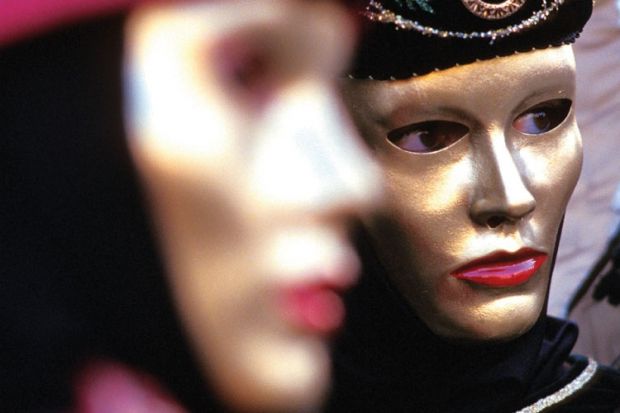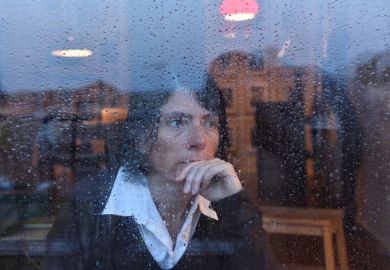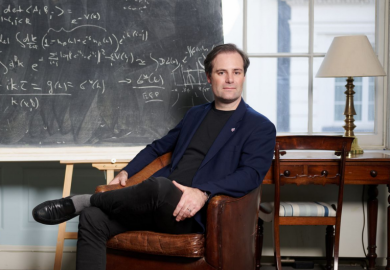Source: Alamy
The feelings of fraudulence were neither isolated nor a symptom of purely personal anxieties but rather a systemic feature of life in the late-modern academy
On a recent train commute to work, a young man, seeing me editing some documents, asked me what work I did. I told him that I was a university lecturer. “That must be a cushy job,” he responded cheerily. Given his beaming smile, I felt that an equivocal murmur was the most appropriate response.
I was lucky that his was such a benign reaction. Academics find only tepid favour in Australia at the best of times and when the financial climate is tough, or when they dare to raise a public voice about their working conditions, they are likely to find themselves the object of public derision. As one online commentator, responding to an ABC news story about academic redundancies, sneered: “Come off it. All academics do is read, think, tap on a keyboard, blow hot air and sit on their butts. How difficult is that? Do you actually believe that qualifies as hard work? Hard work is done in the mines, in the hospital wards, on construction sites…”
This scepticism is particularly directed at academics in the arts and humanities, who are increasingly likely (in the UK, too) to find their claims that they contribute to a wider social or cultural good ridiculed in favour of a view of such subjects as private indulgences that should not be subsidised by the public purse.
In this grim context, it is foolish to expect much public sympathy when academics attempt to critically analyse the lived realities of working in the university today. And yet there are important conversations about well-being that academics need to have as a group.
One particular observation has stayed with me from my earliest days in the academy, when I began to notice that many of my colleagues (especially women) gave out subtle signs that they did not feel they were up to the job – almost as though they had been employed in error and would sooner or later be found out. My shorthand term for this phenomenon was “feelings of fraudulence”. I recognised these signs in part because I was experiencing something similar, feeling uneasily that I didn’t know “enough”, or the right things. This was quite unexpected, as I had had a highly successful passage through university and several happy years as a schoolteacher. But it was explicable, since I had made a big intellectual shift from a disciplinary formation in English and languages to a postgraduate training in cultural studies.
As the years passed and the quiet conversations with colleagues continued, I began to realise that the feelings of fraudulence were neither isolated nor a symptom of purely personal anxieties but rather a systemic feature of life in the late-modern academy. I made it a question of principle to name it as such and to subject it to the same kind of analysis as other facets of institutional life.
So it is that over the past decade, my thinking about feelings of fraudulence has transformed from a private distress to an intellectual curiosity, a pedagogic challenge and an ethical imperative. I now approach the subject quite straightforwardly, convinced of its political, ethical and human importance, especially, but not only, to postgraduates, early career academics and the ever-growing pool of academics employed casually or on short-term contracts. Nonetheless, I am aware that feelings of fraudulence are a difficult thing to admit to, or even talk about, since they are accompanied by a sense of shame and, as Elspeth Probyn, professor of gender and cultural studies at the University of Sydney, notes cogently in her book Blush: Faces of Shame (2005), shame is itself shaming.
The lack of a professional language to describe a commonplace professional feeling is itself a symptom of the problem. In the highly pressurised and competitive world of the contemporary academy, it is easy to take on board the tactics of individualisation and pathologisation so beloved of university managers who tend, in general, to address problems of structural change in the language of psychology: “coping” or “not coping”; “resistant to change” and so on. It is against this individualising logic that a structural analysis of painful feelings is important. This refusal to depoliticise personal experience remains a feminist staple.

So what are some of the structural conditions of the contemporary academy that might produce, or amplify, the painful feeling that one isn’t as fit for the job as one’s colleagues?
First, the academic job has got bigger. Work intensification is a documented feature of many professions, and academia is no different. Student numbers have risen, postgraduate education has expanded massively, research is driven by a productivist imperative, and the administrative dimensions of academic work are greatly increased.
Second, the job has got more complex. Intellectual landscapes are more intricate than ever: knowledge expands and changes rapidly, is exchanged globally, and is often uncontained by disciplinary boundaries. In some disciplines its contours may differ markedly according to where one is located. In such a context, it is easy to think, as I did, that one does not know enough.
Teaching, too, has become more complicated. Not only have student numbers increased but the student body is now more diverse (and, it seems to me, more anxious and troubled) than ever before. Academics’ pedagogical skill is, rightly, subject to new expectations and scrutiny, but the means of scrutiny are often misconceived and easily conflated with managerial and consumer concerns. The relation of teachers to their students now involves a complex dynamic of pastoral care, service provision and legal contract-making as well as expertise in content and delivery.
Meanwhile, the world of academic work has become more stratified. No longer is it a question only of hierarchies of senior to junior staff but also of a stark division between those who have permanent work (“insiders”) and those who inhabit the precarious zone of casual and short-term academic labour – what Megan Kimber, senior research assistant in the Faculty of Education at Queensland University of Technology, terms the “casual periphery”. This sub-world is so developed that it has its own identity and type of collegiate; a world some are calling “para-academia”. Margaret Mayhew, author of a forthcoming chapter on para-academia in The Para-Academic Handbook: A Toolkit for Making-learning-creating-acting, notes how easy it is for people working in this scholarly sub-world to see themselves as being at the bottom of the heap – trapped, abject and caught in “a culture of anxiety and resentment”.
In such a competitive and stratified system, anyone employed on a continuing basis is likely to be grateful that they have a job, to be under pressure to constantly demonstrate their right to that job, and to be subject to increased demands within it. The flip side of the vicissitudes of mass casualisation is the increasing burden placed on the diminishing pool of full-time academics. Scrutiny of this shrinking pool of tenured academics is intense, time-consuming and often based on proxies for qualities whose value is dubious and which are certainly not the neutral, objective, pan-disciplinary markers of worth for which they are too often taken. It is a peculiarly demoralising thing to run oneself into the ground struggling to win at a game one doesn’t believe in.
This demoralisation connects to another, more fundamental, reason for the feeling of being a fraud – the changing role of the university itself as an institution. The contemporary university is not merely a corporation – as is all too easily claimed – but something rather more complex and fraught. It is, in my view, a palimpsest – at once a scholarly community, a bureaucracy and a pseudo-corporation. It is required to be the bastion of tradition and culture, an engine of innovation and discovery, a lean and efficient bureaucracy and a corporate success. The fact that some of these goals may be mutually exclusive is rarely acknowledged.
It is hard to work conscientiously and in good faith for a hybrid institution that pulls forcefully in so many different directions. As Bill Readings noted astutely almost 20 years ago in The University in Ruins: “No one of us can seriously imagine him or herself as the hero of the story of the University, as the instantiation of the cultivated individual that the entire great machine works night and day to produce.” Nonetheless, academics are expected to try, and all too often we serve as the human glue striving to hold the fractured university together. No wonder so many people feel they cannot do enough, or get it right, or get on top of it all.

All too often academics serve as the human glue striving to hold the fractured university together. No wonder so many people feel they cannot do enough
But we continue to try, animated in many cases by a sense of vocation. Vocationalism remains central to the university, even in its pseudo-corporate form. The university runs and relies on gifted or sacrificial labour to an extraordinary degree. It is astounding that the university system is prepared to squander that deep pool of traditional goodwill – that it fails to see even the economic value of that vocationalism, let alone something richer, and that auditing mechanisms treat people who have spent their lives doing extra unpaid work because they love it as though they were naughty children.
Vocationalism is an interesting psychological beast. Psychologists recognise the significant correlations between a sense of purpose and physical, psychological and emotional well-being. On the flip side, thwarted, unacknowledged or exploited vocationalism is not just stressful or tiring; it is demoralising. Given that, the repeated finding that academics have a faltering sense of mission – or rather, that they see a widening gap between what they consider to be the core of their work and the work they spend most of their time doing – is cause for concern.
But where are feelings of fraudulence in all this? Am I not merely describing a type of stress or anxiety? Well, yes and no. Perceived fraudulence can result from feeling overburdened, but it has its own particular shape. “I’m not doing what I’m supposed to be doing, or what others are doing”, “I don’t belong here” and “I’m not good enough” are three recurring refrains. Clearly, it is connected to a threatened sense of purpose, and most of all to feeling that one is occupying a place to which one has limited right.
Some of us start off with a more secure sense of being in the right place than others. I’m lucky: I’m white, English is my first language and my father was an academic. The “coping” odds have been stacked in my favour. Reshuffle that deck and the picture might look quite different.
Feelings of fraudulence, then, should not be read as anxiousness per se, but rather as a mismatch between perceived capacity and expectations, and between self and role. Certain social factors, such as gender, age, class, ethnicity of country of origin, may increase the possibility for this mismatch. In that light, it is no coincidence that my first thoughts about fraudulence came from conversations with female colleagues who were, perhaps, more likely to have had the experience in the first place, and certainly more likely to give voice to it.
Today, when I share my ideas about feelings of fraudulence with postgraduates and junior colleagues, the experience is likely to be widely acknowledged. Whenever I have set an academic discussion of fraudulence as a reading in a postgraduate thesis development course, I have received numerous emails from students who recognise themselves in it and are grateful that it is “not just them”.
This is what has led me to consider feelings of fraudulence positively – as a pedagogical and collegial resource. If we relegate them to silence, we condemn many of our students and colleagues to wrestling privately with painful feelings and we miss many opportunities to learn about the disciplinary and material conditions of knowledge production and to engage in much-needed political critique of the university and its future.
If we continue to behave as though feelings of distress and fraudulence are unwarranted, private aberrations rather than logical responses to a fractured, competitive system, then we cannot make any effective progress on reforming the system itself.
Register to continue
Why register?
- Registration is free and only takes a moment
- Once registered, you can read 3 articles a month
- Sign up for our newsletter
Subscribe
Or subscribe for unlimited access to:
- Unlimited access to news, views, insights & reviews
- Digital editions
- Digital access to THE’s university and college rankings analysis
Already registered or a current subscriber?





